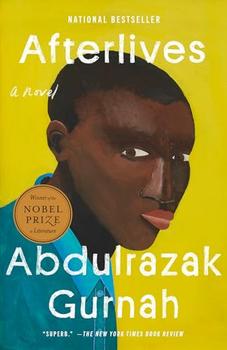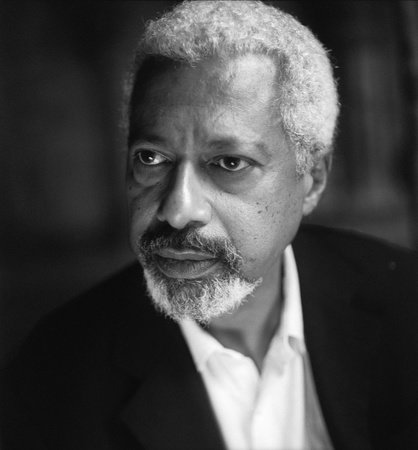Summary | Excerpt | Reviews | Beyond the Book | Read-Alikes | Genres & Themes | Author Bio

A Novel
by Abdulrazak GurnahThis article relates to Afterlives
 Abdulrazak Gurnah, the Tanzanian-born British author of Afterlives, is the 2021 winner of the Nobel Prize in Literature and the first Black writer to win it since Toni Morrison in 1993. He was awarded the prize "for his uncompromising and compassionate penetration of the effects of colonialism and the fate of the refugee in the gulf between cultures and continents."
Abdulrazak Gurnah, the Tanzanian-born British author of Afterlives, is the 2021 winner of the Nobel Prize in Literature and the first Black writer to win it since Toni Morrison in 1993. He was awarded the prize "for his uncompromising and compassionate penetration of the effects of colonialism and the fate of the refugee in the gulf between cultures and continents."
Gurnah is understandably interested in postcolonialism and displacement. He grew up in Zanzibar, an island off the east coast of Africa, when it was a British protectorate and a sultanate (now it is part of Tanzania). In January 1964, a leftist revolt overthrew the sultanate to establish a republic, which ended the power of the Arab ruling class over the majority-African population but also resulted in what TRT World describes as a "bloody reprisal against the island's Arab and Asian populations" and racial persecution.
After the revolution, Gurnah, whose family was Muslim and of Yemeni descent, moved to Britain. As he wrote in the Guardian in 2001, "1964 had seen a violent uprising that led to catastrophic upheaval. Thousands were slaughtered, whole communities were expelled and many hundreds imprisoned. In the shambles and persecutions that followed, a vindictive terror ruled our lives. At 18, the year after I finished school, I escaped."
A New York Times article reports that Gurnah said that "his sense of dislocation was immediate on arriving" in England, and he experienced everyday racism for the first time. It's no surprise then that, as the British Council puts it, "migration and displacement, whether from East Africa to Europe or within Africa itself, and the clash of cultures they engineer, are central to all Gurnah's novels." Afterlives, as well as Gurnah's first critically acclaimed novel Paradise, center on German colonialism in East Africa, and the violent cultural clash—and enmeshment—that it produces.
In his Nobel Prize lecture, Gurnah spoke about the revolution in Zanzibar and how it affected his writing: "A profound chaos descended on our lives in the mid-1960s, whose rights and wrongs were obscured by the brutalities that accompanied the changes brought about by the revolution… It was only in the early years that I lived in England that I was able to reflect on such issues, to dwell on the ugliness of what we were capable of inflicting on each other." But his concern is not just that ugliness—it is also the "tenderness amid cruelty" and the "capacity for kindness in unlooked for sources."
Many of Gurnah's novels have been in low stock in recent years—and out of print in the United States—due to his small readership, but they are now being reissued and translated into dozens of languages—including Swahili, Gurnah's first language and the primary language of Zanzibar.
Photo: Abdulrazak Gurnah, © Mark Pringle, courtesy of Penguin Random House
Filed under Books and Authors
![]() This article relates to Afterlives.
It first ran in the September 7, 2022
issue of BookBrowse Recommends.
This article relates to Afterlives.
It first ran in the September 7, 2022
issue of BookBrowse Recommends.
Your guide toexceptional books
BookBrowse seeks out and recommends the best in contemporary fiction and nonfiction—books that not only engage and entertain but also deepen our understanding of ourselves and the world around us.